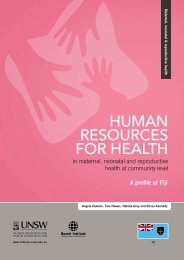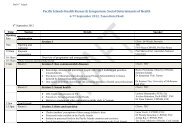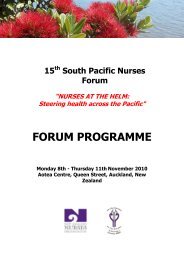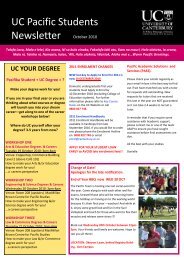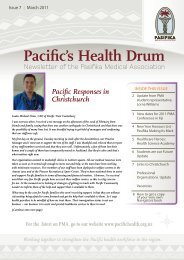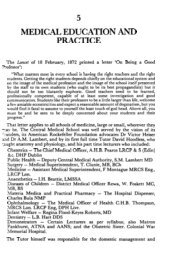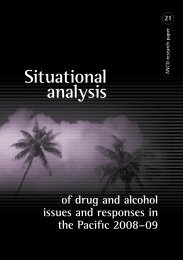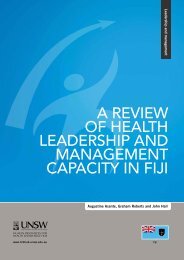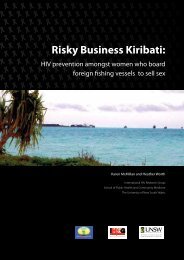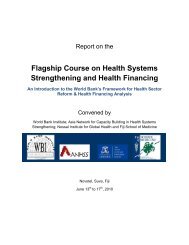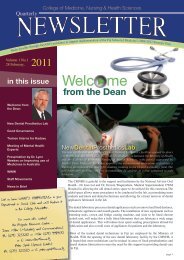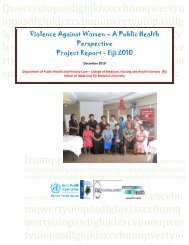rp21 situational analysis - Pacific Health Voices
rp21 situational analysis - Pacific Health Voices
rp21 situational analysis - Pacific Health Voices
Create successful ePaper yourself
Turn your PDF publications into a flip-book with our unique Google optimized e-Paper software.
Situational <strong>analysis</strong> of drug and alcohol issues and responses in the <strong>Pacific</strong><br />
78<br />
of KANGO include the Alcoholic Awareness<br />
and Family Recovery Association with activities<br />
focusing on education and awareness, in<br />
addition to recovery support. 382 Other relevant<br />
members include the Kiribati Overseas<br />
Seafarers Union and the Kiribati Counsellors’<br />
Association. 383 Churches in Kiribati wield much<br />
social and cultural influence; by contrast,<br />
NGOs are few and underdeveloped. 384<br />
Regulation<br />
In 2005 a framework for alcohol policy proposed<br />
changes in taxation and liquor availability.<br />
In addition, a government action plan<br />
for youth based on an integrated approach<br />
to reduce drinking harms was developed.<br />
Proposals included prevention and counselling<br />
services funded by a 10 per cent increase<br />
in taxation on imported alcoholic beverages,<br />
in addition to establishing a national youth<br />
coordinating body.<br />
The decision to implement a tax-based response<br />
is significant given that all beer and<br />
other alcohol are imported from Australia,<br />
and two out of seven importers of alcohol to<br />
Kiribati are government-owned: Abamakoro<br />
and BKL. These two companies are responsible<br />
for importing over 60 per cent of the<br />
available beer. An assessment of quantities<br />
of alcohol imported in 2002, compared with<br />
the 2001 and 2000 years, shows a 24.5 per<br />
cent increase for beer, increases of 77.6 per<br />
cent and 73.8 per cent respectively for spirits<br />
and pre-mixed spirits, with wine dropping<br />
by 46 per cent. The 2002 data provide a<br />
per capita intake of 2.92 litres per head of<br />
population aged 20 and over. This does not<br />
include local toddy.<br />
Recent concerns about alcohol sales include:<br />
minors being sent to buy alcohol for a parent;<br />
under-age drinkers being able to buy<br />
alcohol without showing identification; and<br />
minors going into nightclubs, which are open<br />
until 2am. The police have recently been visiting<br />
venues popular with young people in<br />
an effort to curb under-age drinking, with<br />
a significant number of arrests and closures<br />
of sour toddy outlets. Some schools have<br />
petitioned for nearby outlets to be closed<br />
during daylight hours. Recent assessments<br />
at Bikenibu and Betio hospitals indicate that<br />
5–25 per cent of those seeking treatment<br />
out of hours are affected by alcohol. Data<br />
on alcohol-related disorders, such as liver<br />
disease, are poor because of difficulty distinguishing<br />
this from hepatitis B, which is<br />
endemic in Kiribati.<br />
382 Membership of Kiribati Association of NGOs available at: (accessed April 2009).<br />
383 Ibid.<br />
384 NZAID (2007), Strategy for the New Zealand Development Cooperation Programme with Kiribati,<br />
2002–2007. Wellington: NZAID. Available at: .



